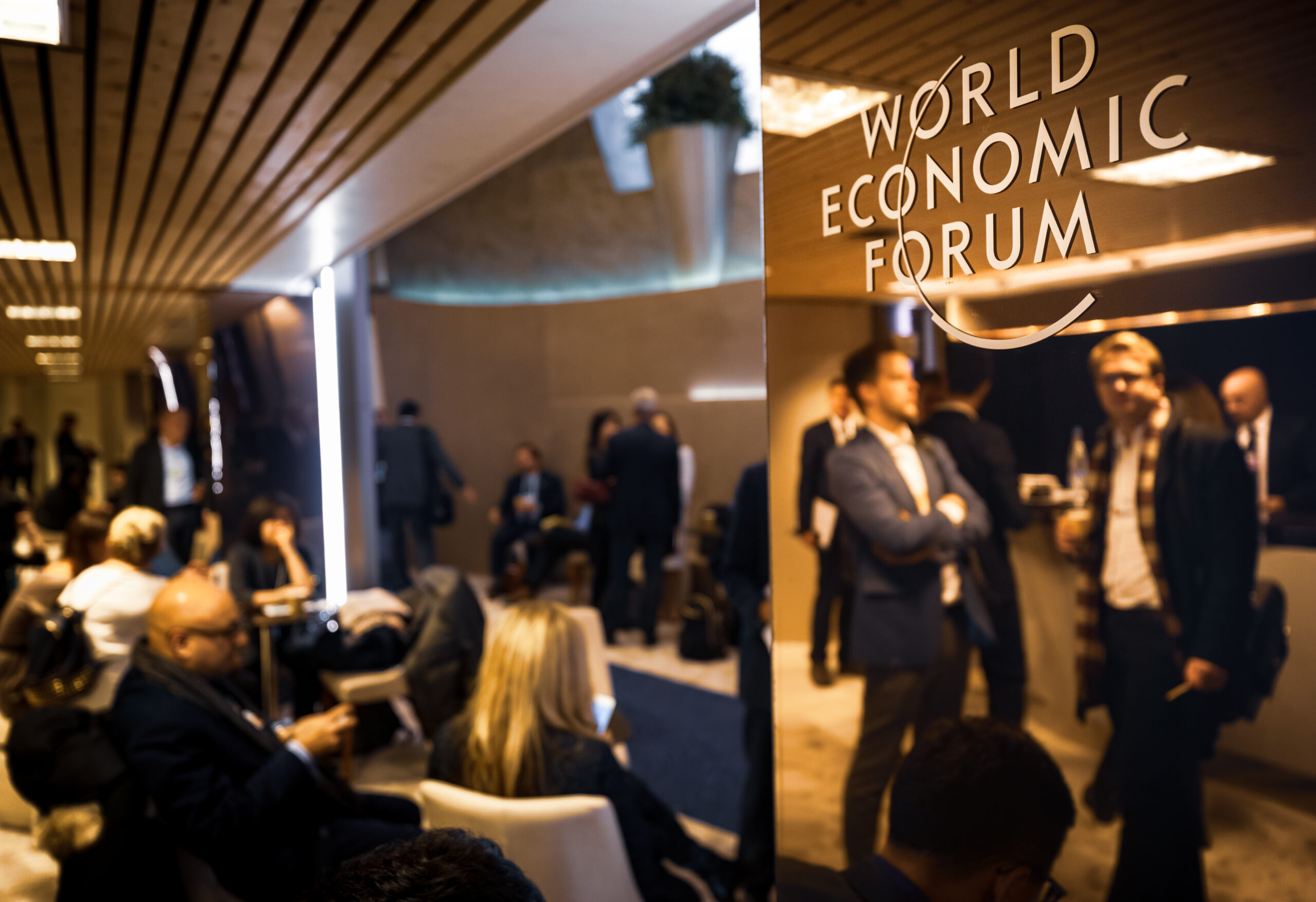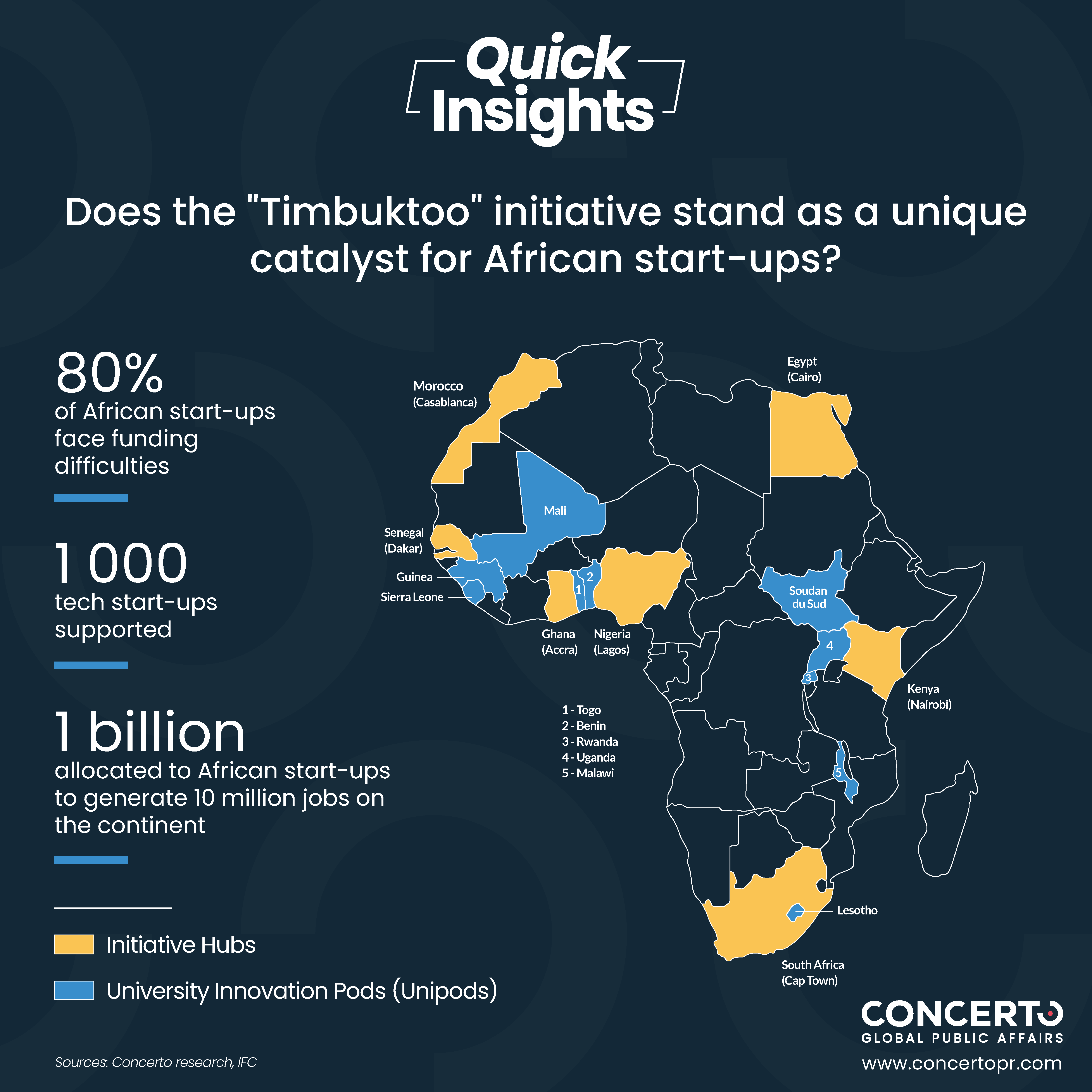Back
Can the "Timbuktoo" initiative fulfil its promise of catalysing African start-ups?
26 January 2024

Analysis
According to Partech Africa's annual report, African start-ups raised $3.5 billion last year, 46% less than in 2022.
About
Wiam Koubia is an analyst at Concerto. Specialising in Africa and the Middle East, Wiam focuses on geopolitical issues in the region. Contact Wiam at her e-mail address, wk@concerto-pr.com , for more information on the subject, or to find out more about how Concerto can help you.QUICK INSIGHTS According to Partech Africa's annual report, African start-ups raised $3.5 billion last year, 46% less than in 2022. Faced with this drop in fundraising, the "Timbuktoo" initiative, launched at the Davos World Economic Forum organised from January 15 to 19, has set itself the goal of boosting the development of start-ups on the continent.
- The UNDP launched the "Timbuktoo" initiative in collaboration with the Presidents of Rwanda and Ghana, and the Secretary-General of the African Continental Free Trade Area.
- The United Nations Development Programme (UNDP) aims to position the "Timbuktoo" initiative as the world's largest financing facility, uniting $1 billion in commercial capital to provide substantial support to the African startup ecosystem.
- President Paul Kagame has demonstrated immediate support for the initiative by committing $3 million to inaugurate the Timbuktoo African Innovation Fund which will be hosted in Kigali.
80% of African start-ups face funding difficulties
Is the boom of African start-ups an illusion? The Timbuktoo initiative emerged in response to the escalating resource constraints faced by African startups. Despite the prominent media portrayal of a thriving entrepreneurial ecosystem, the financial challenges experienced by entrepreneurs cast a shadow on the narrative of African-style self-accomplishment. In 2022, the International Finance Corporation (IFC), the private investment arm of the World Bank, reported that a staggering 80% of African startups were grappling with financing issues. The continent's reliance on alternative financing avenues, such as crowdfunding and business angels, remains limited, catering to only a select number of projects. By 2023, venture investment in Africa witnessed a decline, with a predominant 83% originating from sources outside the continent. Notably, these investments were concentrated in a few countries—Nigeria, Kenya, South Africa, and Egypt—where the fintech industry represents approximately 60% of the total venture capital inflow.The "Timbuktoo" Initiative: a catalyst for the development of African start-ups
The Timbuktu Initiative Allocates $1 Billion for African Start-ups. With a commitment of 1 billion dollars, the "Timbuktoo" initiative aspires to create 10 million new jobs across the continent. The distinctive feature of this initiative lies primarily in its innovative design, which integrates both commercial capital and catalytic capital (derived from public or philanthropic sources). The overarching goal is to mitigate the risks associated with private investment. What sets this initiative apart is its innovative approach, blending commercial and catalytic capital (public or philanthropic funding) to mitigate the risks associated with private investment. In contrast to existing incubators or startup support funds on the continent, Timbuktoo distinguishes itself by offering entrepreneurs comprehensive assistance in establishing their businesses. This distinctive feature separates Timbuktoo from other startup support projects, such as TLCOM's Tide Africa II Fund backed by the African Development Bank. Each hub established under Timbuktoo provides a robust support structure, functioning as both a startup incubator and a venture capital fund. Notably, Timbuktoo breaks new ground by managing each hub independently, with a sharp focus on a single vertical sector. For instance, there's a Fintech hub in Nigeria, a Healthtech hub in Rwanda, a Greentech hub in Kenya, and a Creative Industries hub in South Africa.Fostering and accelerating the development of start-ups despite the lack of government support
Can the Timbuktoo initiative address the administrative barriers hindering the creation of start-ups? The deficiency in the availability of incubators, accelerators, and coworking spaces emerges as a significant impediment to the advancement of African startups. While initiatives such as the Digital Factory in Morocco and the Lab Innovation in Dakar are gradually surfacing across the continent, they are still unable to meet the escalating demand from entrepreneurs. University Innovation Pods (Unipods) are spaces for innovation, experimentation, and accelerated learning designed to encourage entrepreneurship within African universities. These pods provide students with the tools and advice they need to develop their entrepreneurial projects, helping them to structure their start-ups. Nevertheless, the implementation of this approach gives rise to several questions, particularly concerning the sustainability of the envisioned multi-stakeholder collaboration between the public and private sectors. The Timbuktoo initiative faces the arduous task of persuading stakeholders of its economic capacity to support burgeoning businesses. Overcoming these challenges and garnering governmental endorsement is especially crucial in a context where African startups constitute a mere 0.2% of the global value—a figure that is clearly out of step with the continent's potential for innovation. If successful, the Timbuktoo initiative has the potential to boost the wealth of innovative ideas already present on the continent. At the Davos Forum 2023, the commitment to supporting African startups is crucial in the context of "rebuilding trust," the central theme of the event. This recognition underscores the importance of creating an environment that fosters entrepreneurial growth and innovation, contributing to the broader economic development of the African continent.